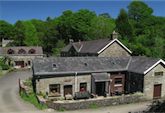It is not only farmers whose lives are dominated by the weather – everyone talks about it, and the culture is rich with weather-based tales, weather folklore and weather sayings. People have carefully watched nature’s patterns and then made their predictions. We have taken a saying for each month – some true, some funny and some silly to draw together a description of typical yearly weather on the farm along with a brief description of what nature is up to. Generally, there are four distinct seasons to the Welsh weather:
Winter in Wales| Spring in Wales | Summer in Wales | Autumn in Wales
January: The blackest month in all the year is the month of Janiveer
February: Better a wolf in the fold than a fine February.
March: March comes in like a lion and goes out like a lamb.
April: April sun and April showers bring forth summer flowers.
May: Who shears his sheep before St Servatius’s Day loves his wool more than his sheep.
June: A cold and wet June spoils the rest of the year.
July: Dog Days bright and clear indicate a happy year.
August: If St. Bartholomew’s be clear, A prosperous autumn comes that year.
September: St Matthew brings on cold dew.
October: Much rain in October, Much wind in December.
November: No warmth, no cheerfulness, no healthful ease, No comfortable feel in any member, No shade, no shine, no butterflies, no bees, No fruits, no flowers, no leaves, no birds – No-vember. Thomas Hood (1799-1845)
December: Frost on the shortest day bodes a bad winter
In light of global warming, the Welsh weather guide and weather sayings should be taken with a pinch of salt. Indeed, the seasons in Wales are becoming more muddled as uncharacteristic weather periods become more frequent. A decade ago, climate change was considered speculation. Now it is a reality. The planet has not been as warm as it is now for a millennium or more. The 10 hottest years on record have all occurred since 1990 and 2005 was the hottest year since records began in the late 1880s. The Earth has probably never warmed as fast as in the past 30 years – a period when natural influences on global temperatures, such as solar cycles and volcanoes should have cooled it down. It remains to be seen what will happen to Wales as a result of global warming. Experts initially predicted a more Mediterranean style climate by the end of the century – a climate too warm for daffodils to grow. More recently there has been speculation that the melting of the Greenland ice cap into the Atlantic may cut off our main source of warm air, the Gulf Stream. If this gets diverted we could end up under a large sheet of ice. Whilst the experts debate whether the future of Welsh tourism is one of siestas or skiing, here at Swansea Valley Holiday Cottages we employ an environmental policy to help us combat climate change.
